How Can Smart Technology Empower A Smart Society? Domestic And Foreign Experts Discuss “Artificial Intelligence And Social Governance”
date:2020-08-24 20:44author:小编source:Smart Learning Instituteviews:
On August 21, 2020, the 2020 Global Smart Education Conference “Artificial Intelligence and Social Governance Forum” was held in Beijing. Representatives from universities, scientific research institutions, government departments, and entrepreneurs from China, the United States, the United Kingdom, France, and Japan discussed how smart technology can be deeply integrated with education, medical care, and elderly care, providing a new vision, new ideas, and new paths for building a smart society.
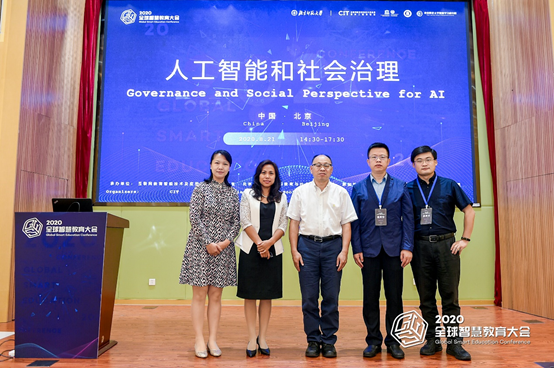
This forum was organized by the National Engineering Laboratory of Intelligent Technology and Application for Internet Education, the Chinese Academy of Social Management of Beijing Normal University, and the Learning Development and Research Center of Nanyang Technological University, Singapore. The meeting was co-chaired by Professor Wang Yaonan, Academician of the Chinese Academy of Engineering, Professor Zhao Qiuyan, Secretary of the Party Branch and Deputy Dean of the Chinese Academy of Social Management/School of Social Studies of Beijing Normal University, and Professor Lu Cijie from Nanyang Technological University in Singapore. Lv Peng, Professor from Zhongnan University and Tong Lili, Associate Professor of the National Laboratories Lilicheng Laboratory, co-hosted the forum. Tencent and Alibaba DingTalk provided support for the forum.
Smart Technology Empowers a Smart Society
Academician Wang Yaonan of the Chinese Academy of Engineering believed that the organic integration and innovation of a new generation of basic information technology represented by artificial intelligence and other technologies was a powerful means and tool for building a smart society. At present, traditional robots are facing three major challenges: first, their environmental perception adaptability is relatively weak; second, they cannot optimize online decision-making; and third, the efficiency of collaboration with robots is relatively low, and they cannot meet the needs of high-end equipment manufacturing. To meet the challenges, three breakthroughs must be achieved, that are: a breakthrough in the real-time intelligent perception of robots, a breakthrough in robot online planning and autonomous decision-making, and a breakthrough in robot-based collaborative operations. The direction of future development in manufacturing is human-machine collaboration. He emphasized that the rapid development of artificial intelligence technology had also put forward new requirements for talent training and provided a new path for educational reform. All technological progress requires education to cultivate creative talents that are suitable for the development of the times. The education field should be aware of changes ahead of time, actively respond to changes, and actively seek changes through a variety of ways to carry out theoretical innovation and practical exploration and contribute to the realization of the common interests of all mankind.
Smart Technology Empowers a Smart Society
Academician Wang Yaonan of the Chinese Academy of Engineering believed that the organic integration and innovation of a new generation of basic information technology represented by artificial intelligence and other technologies was a powerful means and tool for building a smart society. At present, traditional robots are facing three major challenges: first, their environmental perception adaptability is relatively weak; second, they cannot optimize online decision-making; and third, the efficiency of collaboration with robots is relatively low, and they cannot meet the needs of high-end equipment manufacturing. To meet the challenges, three breakthroughs must be achieved, that are: a breakthrough in the real-time intelligent perception of robots, a breakthrough in robot online planning and autonomous decision-making, and a breakthrough in robot-based collaborative operations. The direction of future development in manufacturing is human-machine collaboration. He emphasized that the rapid development of artificial intelligence technology had also put forward new requirements for talent training and provided a new path for educational reform. All technological progress requires education to cultivate creative talents that are suitable for the development of the times. The education field should be aware of changes ahead of time, actively respond to changes, and actively seek changes through a variety of ways to carry out theoretical innovation and practical exploration and contribute to the realization of the common interests of all mankind.
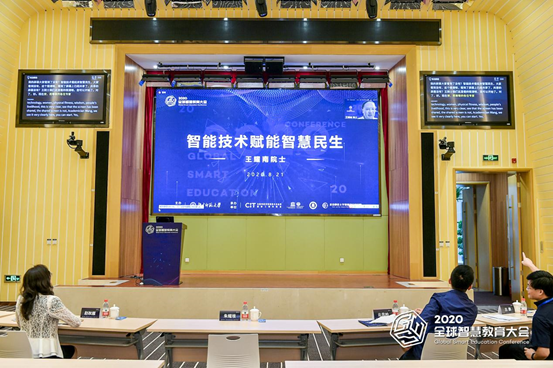
Academician of Chinese Academy of Engineering Wang Yaonan
“Smart Technology Empowers Smart Livelihood”
“Smart Technology Empowers Smart Livelihood”
Professor Luo Zhiwei from Kobe University in Japan believed that we should stay away from the stereotypes and properly handle the relationship between imitative thinking and innovative thinking, draw on the inspirations of the Renaissance, and actively respond to the challenges of the Intelligent Era. He emphasized that people in the future society should self-consciously stay healthy instead of passively receiving medical care; they should be empowered, instead of being assisted by technology. He appealed for the construction of social governance system and global sustainable development by regarding education as the core, humanist exploration as the spirit, research and collaboration as the source, practice as the method.
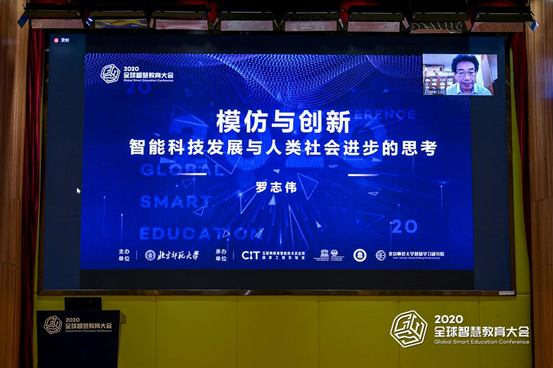
Professor Luo Zhiwei, Kobe University, Japan
“Imitation and Innovation: Thoughts on the Development of Intelligent Technology and the Progress of Human Society”
“Imitation and Innovation: Thoughts on the Development of Intelligent Technology and the Progress of Human Society”
Cai Xiongshan, Deputy Director and Chief Researcher of the Legal Research Center of Tencent Research Institute, believed that data resources were the key production factor for the new generation of technological and industrial revolution. He made a comparative study of the EU and the United States’ systems of data protection, data openness, data flow, and data property rights, and proposed that our country should strengthen the construction of data systems from four aspects to promote the marketization of data: make data more available and accessible to the market; clarify the property right of data to facilitate data transactions; strengthen data protection; actively participate in multilateral/bilateral agreements to promote cross-border data flow.
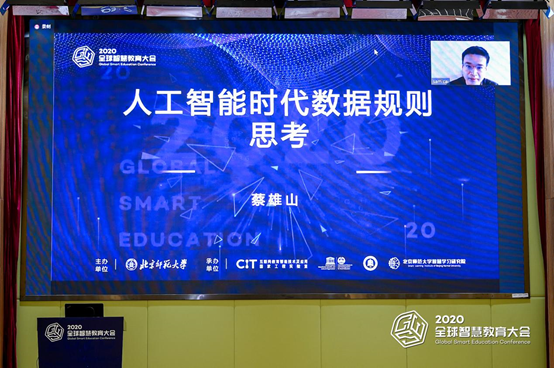
Cai Xiongshan, Deputy Director and Chief Researcher of the Legal Research Center of Tencent Research Institute
“Thinking of Data Regulations in the Era of Artificial Intelligence”
“Thinking of Data Regulations in the Era of Artificial Intelligence”
Educational Changes in the Intelligent Era
Professor Lv Cijie from Nanyang Technological University in Singapore believed that the future empowerment of artificial intelligence in education was mainly reflected in three aspects: providing personalized guidance for each student; providing intelligent support for group learners; creating a realistic virtual learning environment to solve real life problems. He proposed that in order to embrace the era of artificial intelligence, education should be focused on six aspects: first, cultivating the knowledge, skills, abilities, and personality of learners and workers to adapt to the situation where existing jobs were replaced by automatic machines; second, establishing a good mindset that embraces change; third, enabling learners to work together and make full use of automated tools in the process; fourth, transforming learners to be not only users of technology, but also the creators and innovators; fifth, cultivating computational thinking to understand the working principle of computers; sixth, cultivating artificial intelligence literacy to understand how machines work.

Professor Lu Cijie, Nanyang Technological University, Singapore
“Is Education Ready for the Era of Artificial Intelligence? Is Artificial Intelligence Ready to Empower Education?”
“Is Education Ready for the Era of Artificial Intelligence? Is Artificial Intelligence Ready to Empower Education?”
Wayne Holmes, an expert from the Nesta Foundation in the United Kingdom, pointed out that the applications of learning-oriented artificial intelligence were mainly seen in collaborative learning, continuous evaluation and AI learning partners, while the applications of artificial intelligence in teaching were seen in intelligent question- answering systems and AI teaching assistants. The impact of artificial intelligence on education is a double-edged sword, both positive and negative. The key is that educators, learning scientists, and decision makers should interact closely with computer scientists and AI developers to ensure that AI education applications can meet actual needs. AI should always be based on enhancing the ability of teachers instead of trying to replace them.
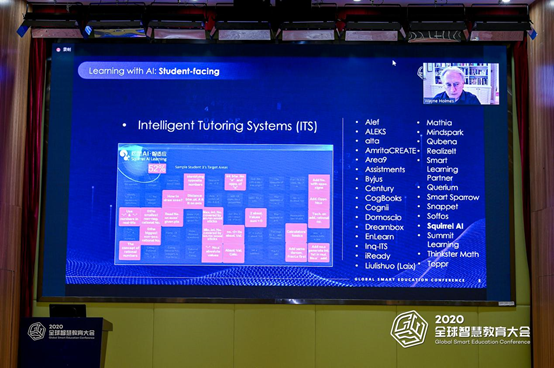
Wayne Holmes, Expert of Nesta Foundation, UK
“Artificial Intelligence and Education: Implications and Significance of Teaching and Learning”
“Artificial Intelligence and Education: Implications and Significance of Teaching and Learning”
Professor Colin de la Higuera from the University of Nantes in France introduced the X5-GON project for open educational resources, which could provide learners with a one-stop data-driven learning environment, and shared the project’s research and exploration in AI applications. Before constructing the index, the X5-GON project requires text transcription and multilingual translation of the materials, and then the construction of the index is realized through three methods: keywords, word embedding and topic models. Finally, users use search engines or recommendation systems to access relevant materials.
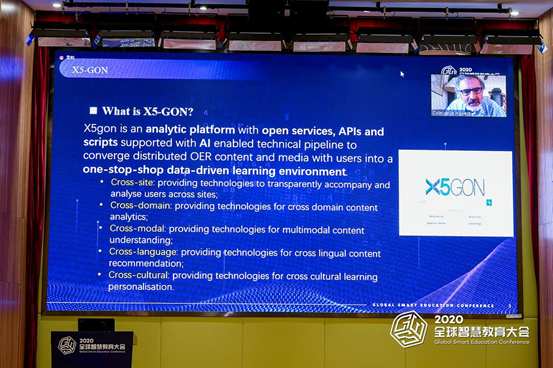
Professor Colin de laHiguera, University of Nantes, France
“Artificial Intelligence and Open Education”
“Artificial Intelligence and Open Education”
Director Lu Tao, Director of Alibaba Dingding Education Industry, believed that the value of “AI+Online Education” lay in providing customized educational content and learning paths, intelligent and automated educational processes and management processes, and providing richer educational interaction methods. He said that “Internet + basic education” is the “new infrastructure” in the field of education. Taking the county as a unit to take the road of intensive and integrated construction will become the future construction model, and the inclusive digital foundation can be achieved through five “onlines”, namely online ecology, online business, online collaboration, online communication, and online organization.
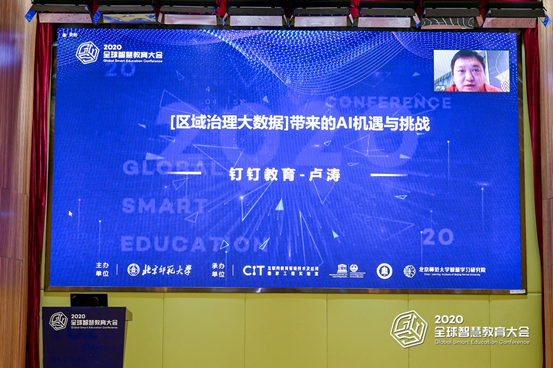
Alibaba Dingding Education Industry Director Lu Tao
“Opportunities and Challenges Brought by ‘Regional Education Big Data Governance’ in the Era of Artificial Intelligent”
“Opportunities and Challenges Brought by ‘Regional Education Big Data Governance’ in the Era of Artificial Intelligent”
Artificial Intelligence Promotes the Improvement of People's Livelihood
Zhu Yaoyin, member of the Party Group of the National Office on Aging and Vice President of the China Association of Aging, believed that in the era of rapid technological development, we must attach great importance to the “digital alienation” encountered by the elderly, and increase the autonomy, independence and sociality of the elderly in the first place. Furthermore, we need to pay attention to the needs of all stages and aspects of the gerontic life and help them integrate into the society. He put forward a number of policy recommendations, including helping the elderly to learn new technologies, which should be included into the voluntary service system; providing education for the elderly to abstain skills in using new technologies, which should be included in government public service; incorporating the smart technology’s friendliness to the elderly into the evaluation of livable cities and communities.
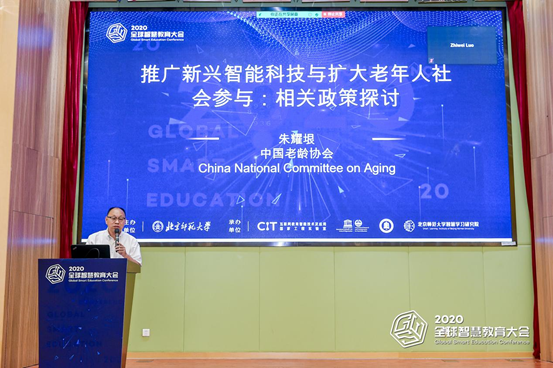
Zhu Yaoyin, member of the Party Group of the National Office on Aging and Vice President of the China Association of Aging
“Promoting Emerging Intelligent Technology and Expanding Social Participation of the Elderly: Discussion on Related Policies”
“Promoting Emerging Intelligent Technology and Expanding Social Participation of the Elderly: Discussion on Related Policies”
Professor Tang Deliang of Columbia University in the United States pointed out that the number and proportion of the elderly population in almost every country had increased, and smart technology could play a more important role in the field of elderly care. He believed that senile neurological degeneration and fall accidents were the two major causes of death in this population. Tapping their “brain reserve” would be an effective way to solve this problem. At present, there have been institutions that used AI technology to simulate human functions and make up for the functions lost because of Alzheimer’s. There has been practical proofs that the connection between AI and education and training is a feasible way to stimulate the brain and explore brain reserves.
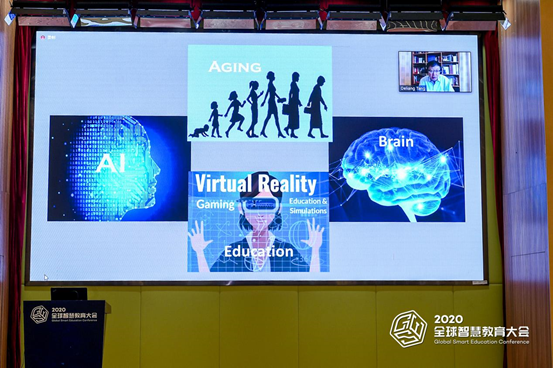
Professor Tang Deliang, Columbia University
"New Ideas and Development Trends of Gerontology - Medical Understanding of the Human Brain"
"New Ideas and Development Trends of Gerontology - Medical Understanding of the Human Brain"
Yun Fengbai, Deputy Secretary of the Political and Legal Committee of the Tianjin Binhai New Area District Committee, systematically introduced the exploration and practice of artificial intelligence and social governance in Tianjin Binhai New Area. In terms of smart city construction, Tianjin Binhai New Area uses smart architecture to promote the innovation of urban management methods, management models, and management concepts, focusing on the modernization of urban governance systems and governance capabilities; in terms of smart social governance, Binhai New Area uses IoT monitoring equipment, smart transportation brains and artificial intelligence, which has greatly alleviated the traffic congestion in the Eco-City; in terms of smart medical services, the “Binhai Internet Smart Medical Integrated Service Platform” uses high-tech means such as the Internet, the Internet of Things, big data, and artificial intelligence to sign contracts with family doctors, stratified care and treatment, remote consultation, etc. to improve basic public health service capabilities; in smart scene applications, smart neighborhoods have built 30 smart application scenarios such as AI face and vehicle recognition, contactless temperature measurement channel, turning on the “smart mode” for neighborhood life.
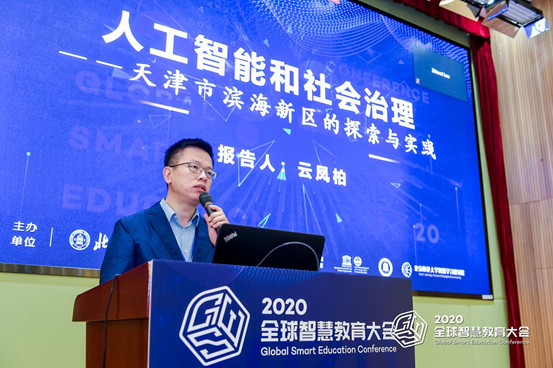
Yun Fengbai, Deputy Secretary of the Political and Legal Committee of the Tianjin Binhai New District Committee
“Artificial Intelligence and Social Governance: Exploration and Practice in Tianjin Binhai New District"
“Artificial Intelligence and Social Governance: Exploration and Practice in Tianjin Binhai New District"

